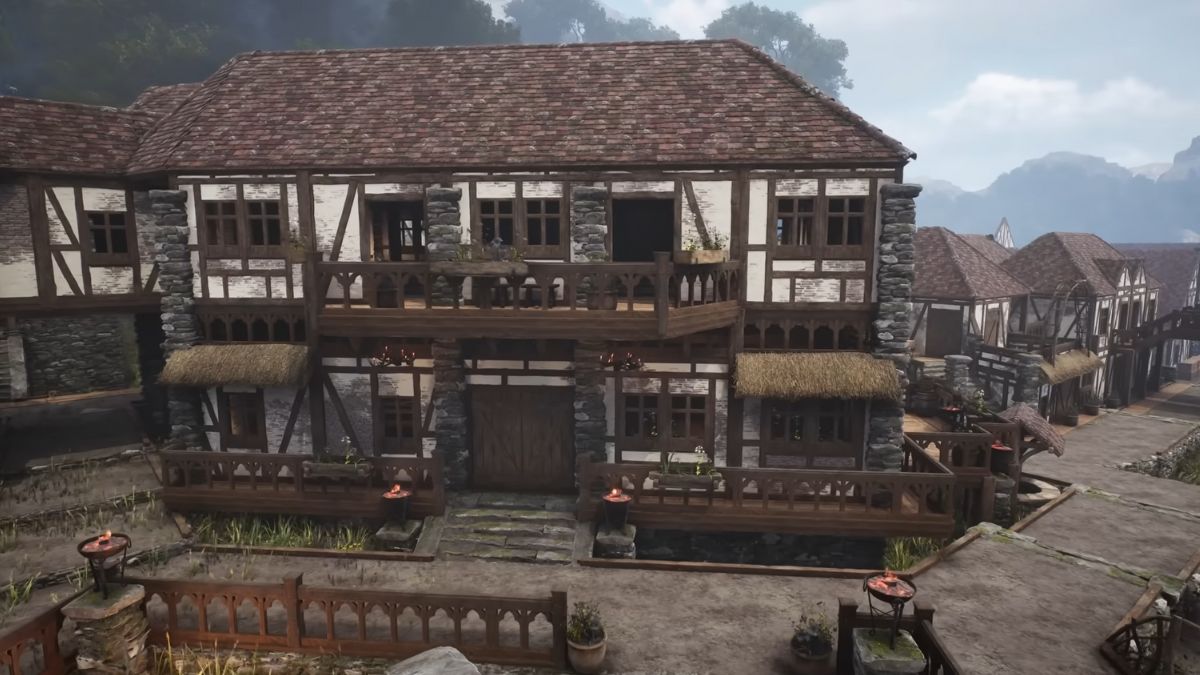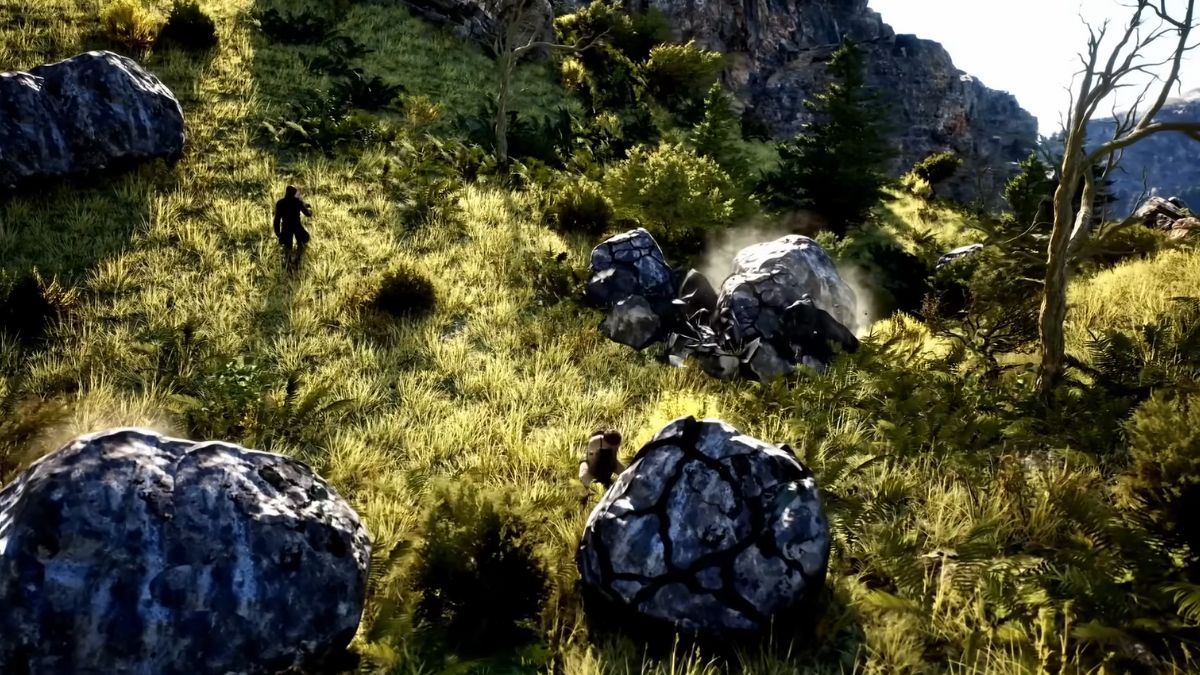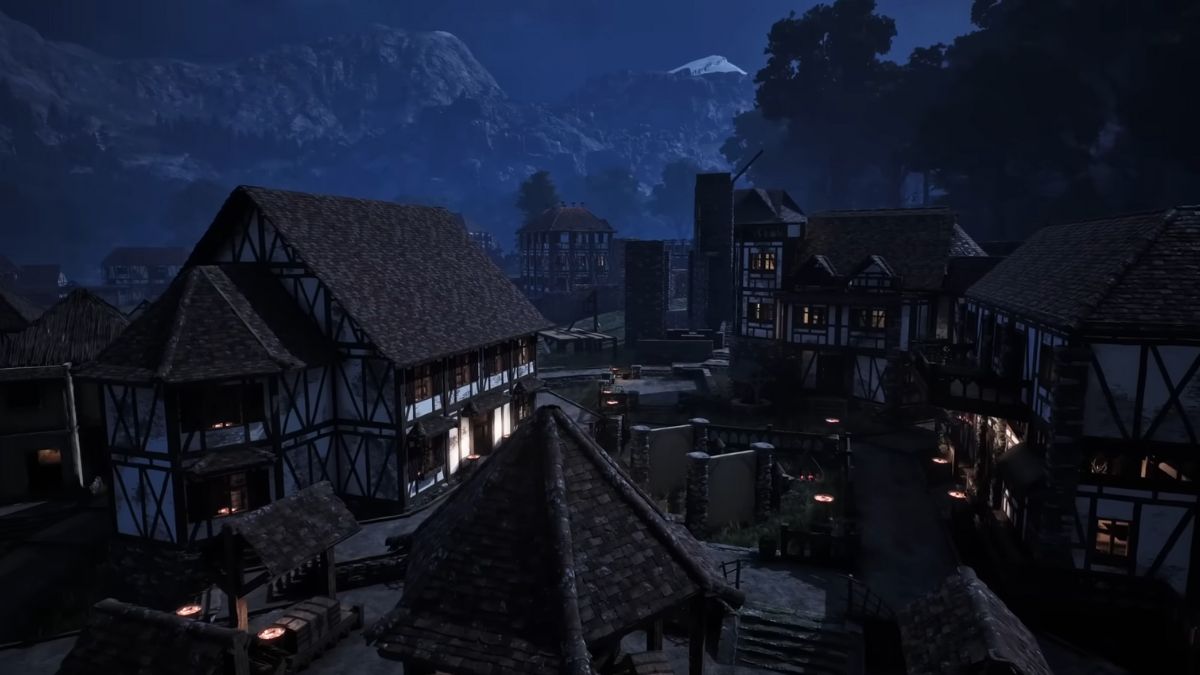Pax Dei was announced in March 2023 and officially enters early access on Steam on June 18, 2024. Ahead of the Founder’s Packs going live and players flooding the servers, developer Mainframe Industries invited me to take a look at the game and get a sense of its vision.
Calling Pax Dei an MMO would be underselling it. Once players load into the game, they’re able to choose their server, which is a chunk of the 400 square kilometer space available at launch. Each server or shard is a place where players can work together to build a settlement, but not in the traditional way you might think.

How Pax Dei is redefining the sandbox MMO
Mainframe Industries CEO Thor Gunnarsson explained how the game works based on its closed alpha tests. In those, content creators were given access and sets of codes to send to their communities. This drew in thousands of players, each forming a community on a server where they set about building a town, village, or city and creating the infrastructure that they needed.
For example, an architect was usually appointed to design the buildings. This is a pretty intense job because every single item in the construction menu is modular and can be tweaked to fit your needs. I was shown a guild hall with a goat head looking off into the distance and a colossal castle built into a mountain. A community with a vision can achieve anything in Pax Dei.
However, to build, you need resources. This isn’t like Minecraft, where you can go into creative mode and grab what you need. Instead, players have to organize themselves into groups. Some will collect wood, others stone, and more still will raid dungeons in the dangerous Wilderness area where they can get gold and other rare materials.
A settlement comes together over time as long as everyone in the community helps out. It reminds me of medieval England, or at least the way it’s often painted in books like Pillars of the Earth. Everyone has a role in a community because they want to help build something bigger. Peasants work farms and get food, hunters get meat for the tavern and skins for the tanners, miners get the precious building blocks for every home, and so on.
While being a wood or stone cutter might not sound like the most enthralling online experience, it’s the fact that you’re helping build something that should get you excited. On day one, you might be the only miner, but three years later, you could have a mining company that coordinates stone for trebuchets for the war effort. You never know where your journey will take you, and you’re always able to swap for something else. I quite fancy being a traveling merchant myself, selling gossip on the side to nobles who have the coin to pay for it.

Pax Dei’s grand experiment
From the start, Gunnarsson calls Pax Dei “a grand experiment,” which sounds like the perfect description. When it’s released in early access, the game won’t be feature-complete because the developer wants to build it with the community that invests in and lives in its world. New features will be added based on a rough roadmap but also the desires of the community and the direction they take the game in.
If, for example, players delve more into PvP and create an economy from the loot around it, then that system will likely get updated before more building mechanics or PvE quests come to the game. In a way, players are free to choose where they want to push the game most because Mainframe Industries is eagerly watching, wanting to enable more dynamic, community-driven gameplay that can exist without constant supervision.
As a parent, this reminds me of setting out groups of toys as stations at which your kids can play. Much like Pax Dei‘s players, some kids will sit at a station and play before moving to another one, while others will bring chaos to the system and mix up the toys with a wider game. It’s all playing, fun, and creating an engaging world for those involved, but everyone is free to choose how they want to play with the tools available to them.
But this world isn’t all peace and prosperity. The Heartlands, areas where players build their settlements, are safe zones without combat. You can spend all your time in these areas if you don’t want to engage in combat, PvE, or PvP and have no interest in dungeons.
Leaving the Heartlands will see you enter the Wilderness, areas where PvP is allowed and there are NPC enemies to engage with. This is how you’ll gather meat from animals and loot from dungeons. In one alpha, players even collectively created a zone in the center of the map that was free-for-all PvP where you could test your builds and see how many players you could kill before dying.
Keeping all this optional is actually more realistic than you might think. Throughout history, there were, of course, bandits and thugs on the road, but people stuck to their roles for the most part. This even applied to nobles and knights, meaning we’ll likely see in Pax Dei that PvP-focused players emerge to protect communities and do nothing else, offering their services so the rest of the group can go about their business safely.
The EVE of Pax Dei
If all this sounds a lot like EVE Online, that’s intentional. Gunnarsson and some of the other developers at Mainframe Industries worked on that game for many years and admire the emergent storytelling it plays host to. At one point, it was impossible to talk about games and not mention EVE Online‘s incredible tales of corporate espionage. Mainframe Industries is hoping for something similar for Pax Dei.
While corporate takeovers are probably a long way off, Pax Dei‘s world is ripe for creative storytelling that occurs organically. You might venture into a dungeon and encounter a group of raiders from a neighboring settlement that you manage to kill and steal from. The next thing you know, there could be a bounty on your head, or you could equip better and better gear until you effectively own a dungeon, charging a fee for anyone who wants to attempt to loot it.
Gunnarsson gave me a great example of how something similar happened in one of the game’s alphas. A glitch gave players the ability to build walls along paths, so naturally, each server set up checkpoints to charge travelers for passing through each section of the map. Gatehouses and entry fees were thought to evolve in the game’s society over time, but this proved that players could and would do anything with the right tools when given half a chance.

A moment in time
To conclude my time speaking with Mainframe Industries, I was taken on a walkthrough of a server that had been preserved from its alpha state. The game will eventually feature regular server wipes, but this settlement has been saved for now as an example of the ingenuity shown by players in such a short space of time. A single architect, who happened to also be a professional architect, had designed the settlement and was effectively sucking up all the resources players brought them from around the world to put each structure together in a coherent way that would make for a nice flow through the area.
There were furnished houses, a fancy hall, a guild hall, and several smaller structures that might be used for storage or the various industries a settlement needs to thrive. As the sun went down, lights lit up the distance. In Pax Dei, you can see across servers, meaning every light in the distance is a real player’s building plot or structure placed somewhere on the colossal world map.
Seeing this made me feel so incredibly tiny. Your character can spend hours chopping wood, but it’ll never be enough to create the grand projects seen in similar games like Bellwright or Valheim. You are insignificant by yourself, but together with others, you form a whole that actually stands a chance of making an impact. You won’t lose your precious city upon death because the overarching goal you share as a small community doesn’t live or die on your shoulders alone. As long as you’re motivated to keep building, others will join you, and you’ll make something admirable, threatening, or awe-inspiring together, depending on how your intentions as a community evolve.
While there are no firm details planned at the time of writing, war is definitely something that’s on Mainframe Industries’ mind. Pax Dei is a game built for petty feuds to transform into continent-spanning conquests. It’s just a matter of time before players get upset enough when someone destroys their settlement.





Published: Jun 16, 2024 10:57 am